Religious Study Pt . 2
Notes on Paschal Mystery and Irenaeus' Theology
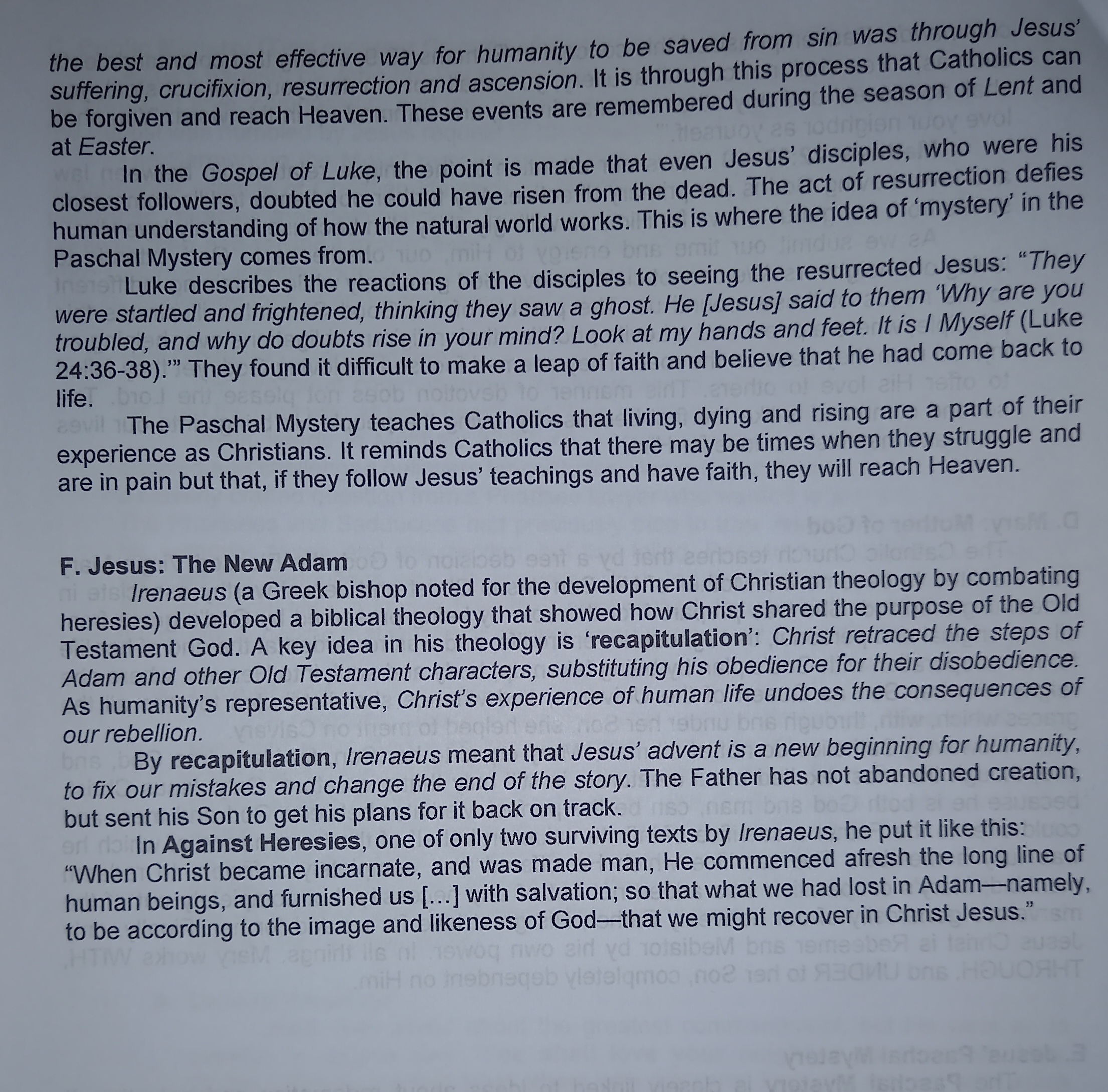
Paschal Mystery
-
Definition: The Paschal Mystery refers to the events of Jesus’ suffering, crucifixion, resurrection, and ascension.
- Importance: This mystery is central to Catholic belief, serving as the foundation for the forgiveness of sins and the hope of reaching Heaven.
- Seasonal Significance: These events are particularly commemorated during Lent and Easter, highlighting their importance in the liturgical calendar.
-
Gospel of Luke Perspective:
- Disciples' Doubt: The passage highlights how even Jesus' closest followers struggled to understand the resurrection. This underlines the human difficulty in accepting divine truths.
- Scripture Reference: Quoting Luke 24:36-38, the narrative emphasizes the challenge of faith, as the disciples were startled and frightened.
- Faith Journey: The Paschal Mystery serves as a reminder for Catholics to have faith even during times of struggle, assuring them of the promise of eternal life.
Jesus: The New Adam
-
Irenaeus' Contribution:
- Role: Irenaeus, a significant early Christian bishop, argued against heresies and elaborated on the purpose of Christ in relation to the Old Testament.
- Key Concept: Recapitulation—Jesus retraced the steps of Adam and other Old Testament figures, correcting their disobedience through his obedience.
-
Recapitulation Explained:
- Humanity’s Representative: By fulfilling human experience, Jesus addresses the consequences of rebellion against God, offering a redemptive model for humanity.
- Purpose of Advent: Irenaeus posits that Jesus' coming was to rectify the mistakes of Adam and to fulfill God's plan.
- Quote from Irenaeus: The text "When Christ became incarnate, and was made man..." emphasizes the salvation offered to humanity through the incarnation.
-
Broader Implications:
- Change of Narrative: The belief that Jesus’ life restores the relationship between God and humanity, suggesting that through Christ, humanity can recover its divine likeness lost in Adam.
These notes summarize the key theological concepts surrounding the Paschal Mystery and the contributions of Irenaeus, providing a deeper understanding of their significance within Christianity.
Reference:
Notes on Catholic Faith and Life
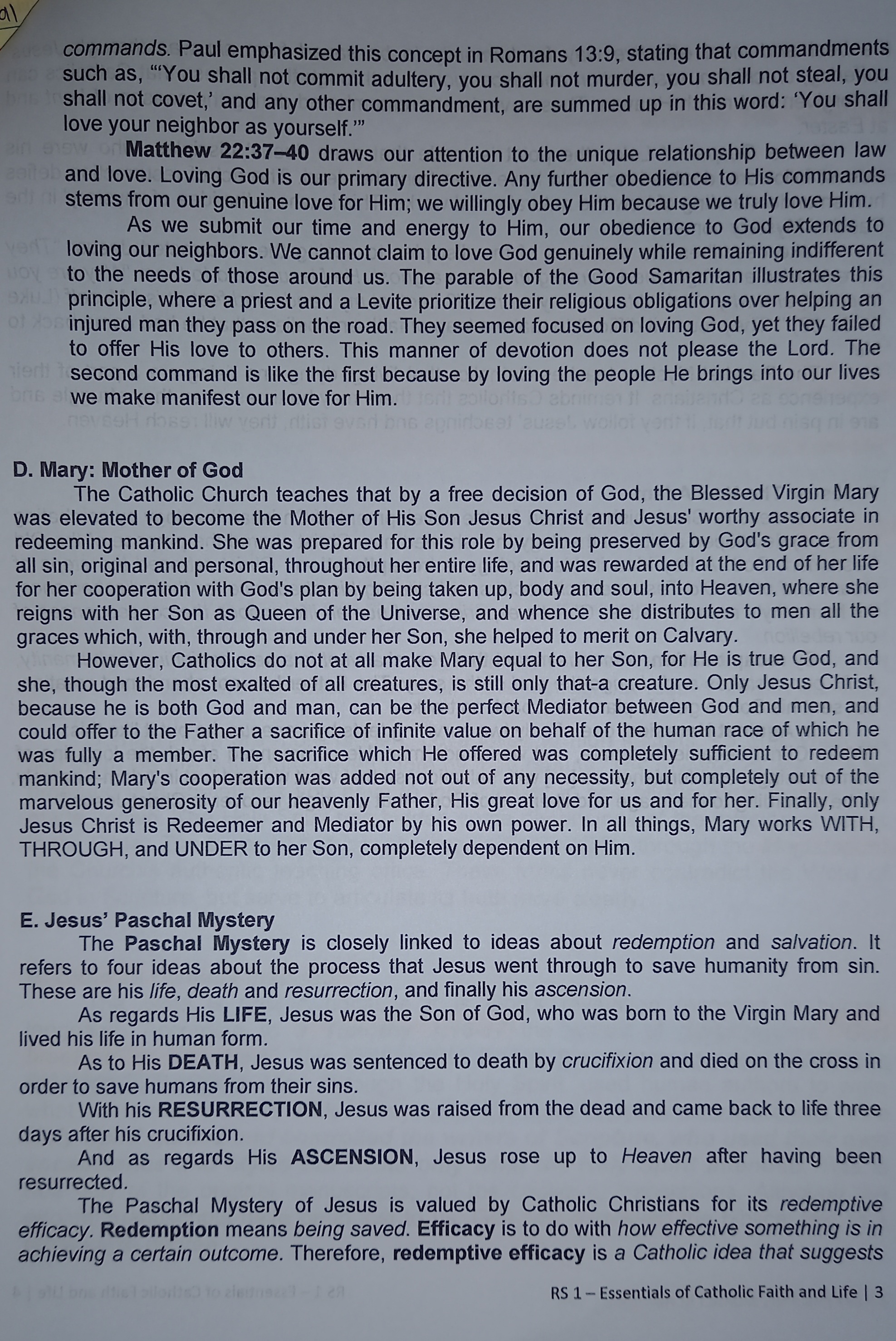
1. Commandments and Love
- Key Concept: The commandments are summed up in the directive to "love your neighbor as yourself."
- This emphasizes that love is central to the practice of faith. Genuine obedience to God's commands stems from our love for Him, which should motivate us to love others.
- The relationship between loving God and loving others is crucial; we cannot claim to love God while being indifferent to the needs of those around us.
2. The Good Samaritan
- Illustration of Love: The parable shows the importance of prioritizing help to others over strict adherence to laws.
- Both a priest and a Levite missed the opportunity to help an injured man, illustrating that religious obligation should not overshadow compassion.
- This teaches that to love God includes actively helping and loving our neighbors.
3. Mary: Mother of God
- Role of Mary: Elevated by God’s grace to be the Mother of Jesus, she plays a unique role in salvation history.
- Her life was marked by sinlessness, allowing her to fulfill her role effectively in God's plan.
- Catholics believe Mary cooperates with Jesus' mediatory role but does not replace it; Jesus is the sole mediator between God and man.
4. Jesus’ Paschal Mystery
- Definition: Central to Catholic faith, the Paschal Mystery refers to the life, death, and resurrection of Jesus.
- Life: Jesus lived a human life, embodying divine principles and teachings.
- Death: His crucifixion is seen as a sacrifice for the sins of humanity, emphasizing redemption through suffering.
- Resurrection: Marks the victory over death, reaffirming believers' hope in eternal life.
- Ascension: Jesus' return to Heaven signifies the completion of His earthly mission and the promise of His ongoing presence with believers.
5. Redemption and Efficacy
- Redemption: The process of being saved from sin.
- Emphasizes that Jesus’ sacrifice was fully sufficient for redemption.
- Efficacy: Refers to the effectiveness of actions in achieving salvation.
- Redemption efficacy stresses that certain actions or sacraments hold the power to facilitate salvation, central to Catholic practice.
Reference:
Public Ministry (Two Greatest Commandments and Beatitudes)
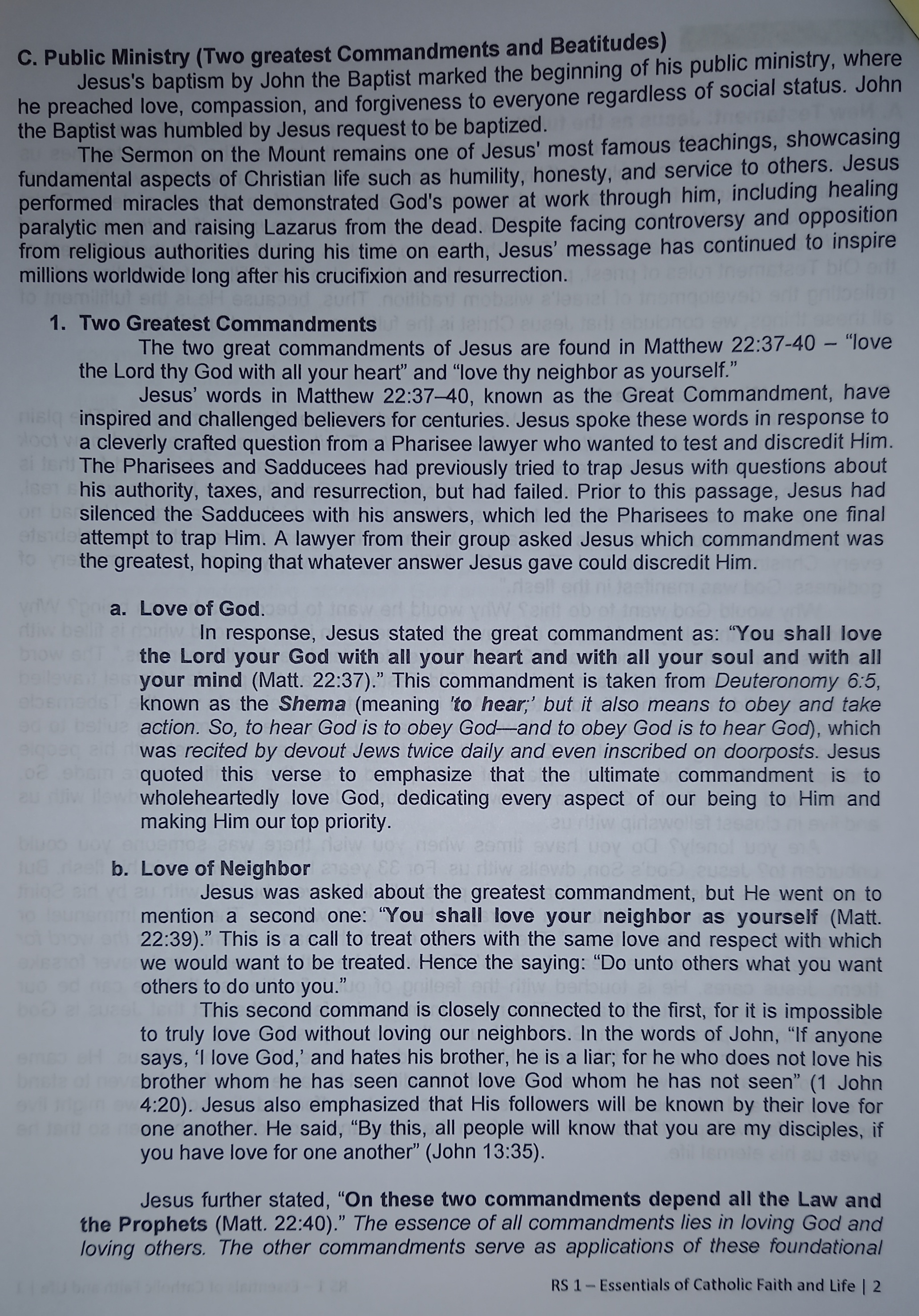
Overview
- Jesus' public ministry was marked by teachings on love, compassion, and forgiveness.
- The Sermon on the Mount emphasizes foundational Christian values such as humility, honesty, and service.
- Jesus performed miracles that showcased God's power, including healing and raising the dead, and faced opposition yet inspired millions.
1. Two Greatest Commandments
a. Love of God
- Commandment: "You shall love the Lord your God with all your heart and with all your soul and with all your mind" (Matt. 22:37).
- Context: This commandment is derived from Deuteronomy 6:5 and highlights total devotion to God.
- Thoughts: It encourages a holistic commitment to God, showing that love for Him should permeate every aspect of life.
- Additional Info: Known as the Shema, this verse is central to Jewish faith and recited daily, serving as a reminder of one's duty to God.
b. Love of Neighbor
- Commandment: "You shall love your neighbor as yourself" (Matt. 22:39).
- Context: This command emphasizes treating others with the same respect and care one desires for oneself.
- Thoughts: It reinforces the interconnectedness of humanity, indicating that love for others is a reflection of love for God.
- Additional Info: Jesus linked this command to the importance of community and mutual respect, illustrating that true devotion to God involves loving others.
Summary of Key Points
- Jesus highlighted the importance of these two commandments in Matthew 22:37-40.
- Love for God and love for neighbor are foundational principles in Christian living.
- These commandments encapsulate the essence of the Law and the Prophets, demonstrating that all ethical teachings stem from these principles.
Reference:
RS 1 - Lecture Notes on the New Testament and Jesus Christ
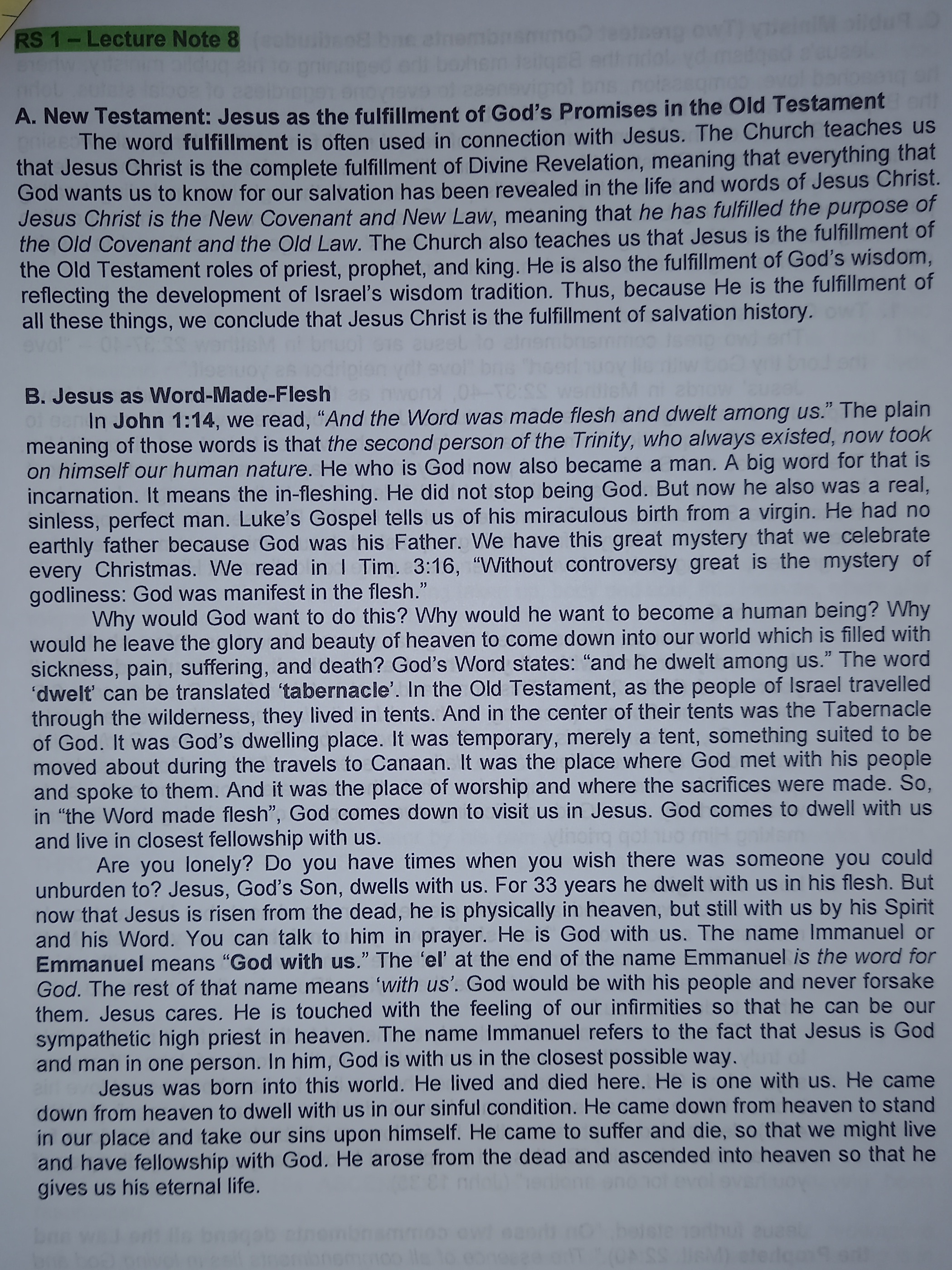
A. New Testament: Jesus as the Fulfillment of God’s Promises
-
Fulfillment of Divine Revelation
- Idea: Jesus Christ embodies the completion of God's revelations.
- Explanation: The New Covenant and New Law established through Christ signifies a new relationship between God and humanity, offering salvation.
-
Relationship to the Old Testament
- Idea: Jesus fulfills the purposes outlined in the Old Covenant.
- Explanation: He acts as prophet, priest, and king, which were key roles in the Old Testament, signifying continuity within the Jewish faith tradition.
-
Development of Israel's Wisdom Tradition
- Idea: Jesus reflects the evolution of wisdom thought in Israel's history.
- Explanation: The wisdom literature and the teachings of Jesus emphasize living in accordance with God's will, showcasing the depth of the Old Testament's insights.
B. Jesus as Word-Made-Flesh
-
Incarnation Explained
- Idea: John 1:14 states that the Word became flesh.
- Explanation: This signifies that Jesus, as the divine Son, took on human form, blending divinity with humanity, without losing His divine nature.
-
Meaning of 'dwelt'
- Idea: The term ‘dwelt’ can be translated as ‘tabernacle’.
- Explanation: Just as the Israelites had a temporary dwelling place for God during their journey, Jesus is portrayed as God's presence among the people, fulfilling the need for divine relationship.
-
God’s Purpose for Incarnation
- Idea: Jesus came to experience human life and suffering.
- Explanation: This underlines the belief that God is empathetic to human struggles and provides a direct relationship through prayer and communion.
-
Significance of 'Emmanuel'
- Idea: The name Emmanuel means "God with us."
- Explanation: This comforts believers by affirming that God intimately understands and shares in human experiences, reinforcing the closeness of the divine.
-
Jesus as a Suffering Savior
- Idea: Christ’s suffering is central to understanding salvation.
- Explanation: Through His suffering, Christ bears humanity's sins and establishes a path for reconciliation with God, which is celebrated in the resurrection and subsequent ascension.
These notes encapsulate the key themes and implications found in the lecture about Jesus Christ as the fulfillment of God's promises and His unique role as the incarnation of God in human history.
Reference:
Notes on the New Covenant and Jesus
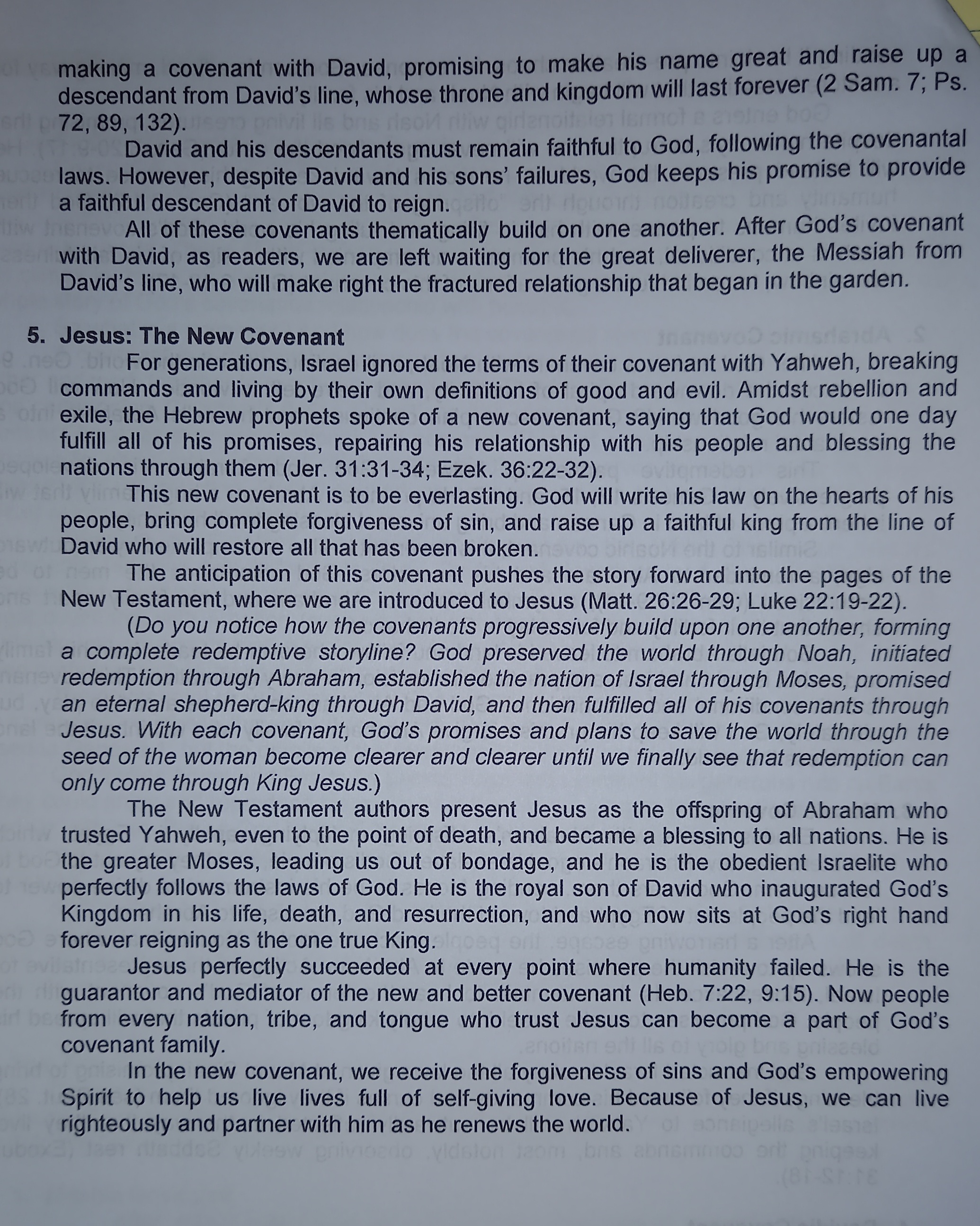
1. Covenant with David
- Key Idea: God made a covenant with David, promising an everlasting lineage.
- Thoughts: This demonstrates God's commitment to His chosen leader and the importance of David's lineage in biblical history.
- Additional Info: The covenant includes promises of a throne and kingdom that will endure, reflecting God’s sovereignty and faithfulness despite human failures.
2. Faithfulness of David's Descendants
- Key Idea: David and his descendants are expected to uphold God's laws.
- Thoughts: This highlights the conditional aspect of the covenant where human faithfulness is integral to divine promises.
- Additional Info: Even with the failures of David and his lineage, God’s promise remains intact, emphasizing grace and mercy.
3. Prophets and the New Covenant
- Key Idea: Hebrew prophets foretold a new covenant amidst Israel’s failures.
- Thoughts: This prophetic tradition offers hope and a vision for restoration, indicating a forward-looking promise for God’s people.
- Additional Info: Key scriptures: Jeremiah 31:31-34 and Ezekiel 36:26-32 outline this new covenant's attributes, including forgiveness and renewed hearts.
4. Introduction of Jesus
- Key Idea: Jesus is presented as the culmination of the covenants.
- Thoughts: This connection illustrates how Jesus embodies the promises made to Abraham, Moses, and David, filling the role of the ultimate deliverer.
- Additional Info: References to the New Testament (e.g., Matt. 26:26-29, Luke 22:19-22) emphasize Jesus' role in fulfilling these prophecies.
5. Jesus as the Divine Mediator
- Key Idea: Jesus succeeded where humanity failed, serving as the guarantor of the new covenant.
- Thoughts: His role as a mediator emphasizes the need for divine intervention in humanity’s relationship with God.
- Additional Info: Books of Hebrews (Heb. 7:22, 9:15) speak to the transformative power of this new relationship through faith in Jesus.
6. Empowerment through the Holy Spirit
- Key Idea: Through Jesus, believers receive forgiveness and the empowering presence of the Holy Spirit.
- Thoughts: This aspect is crucial for living a life aligned with God’s will, symbolizing a new beginning for believers.
- Additional Info: The call to live in love also emphasizes community and partnership with God in the mission of renewal.
Summary
- The document lays out the progression of biblical covenants, highlighting the promise of a Messiah from David's line. Through Jesus, these covenants reach fulfillment, establishing a new covenant that offers forgiveness and renewal, inviting all believers into a transformative relationship with God.
Reference: